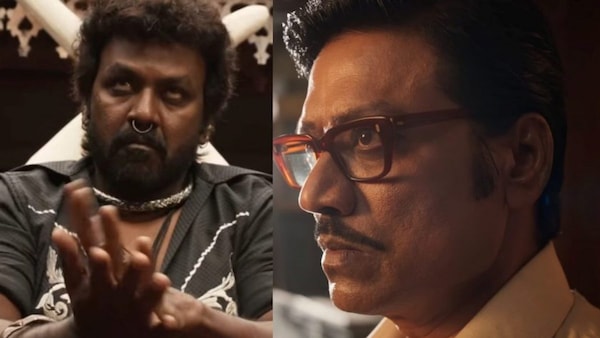Jigarthanda Double X movie review: Karthik Subbaraj delivers a memorable cinematic experience
In Jigarthanda Double X, director Karthik Subbaraj shows how cinema can effect tectonic shifts in society.

Last Updated: 04.41 PM, Nov 10, 2023
Jigarthanda Double X story
Jigarthanda Double X tells the story of a filmmaker who uses the art of cinema to tame a wild and ferocious cold-blooded killer.
Jigarthanda Double X review
The main theme of Jigarthanda Double X is an examination of an age-old question: how does art affect life and vice versa? "Look at cinema just as cinema," implored Thalapathy Vijay while speaking at the Leo success meet. But is it possible? Can our impressionable minds accept moving images as just a form of entertainment, process them as just a figment of someone's imagination and take nothing to heart from them? Is it humanly possible?
Even the sharpest minds are not immune to the profound effects of cinema. This medium has the power to change our way of thinking, make us feel new emotions and encourage us to open ourselves to different perspectives. Not for nothing, cinema is called an "empathy machine." And director Karthik Subbaraj is a firm believer in it. His runway hit Jigarthanda (2014) narrated a story of how a cold-hearted gangster falls in love with cinema and undergoes a seismic transformation.
In Jigarthanda Double X, Karthik revokes the same theme but he scales up its scope. He shows how cinema can effect tectonic shifts in society.
Set in the 1970s, in Jigarthanda Double X, we meet Caesar, a die-hard fan of Hollywood star Clint Eastwood. As the title suggests, Caesar is a cold-hearted person, and it's a rich trait in his line of business. He doesn't think twice before putting a bullet into someone's right eye or using film reels as fuel to set someone ablaze. He's a ruthless killer and it's the only way he can imagine himself. His ability to kill without guilt or regret is what defines him and keeps him at the top of the food chain in the underbelly of the Madurai underworld.
On the other side, there is Kirubakar, aka Ray Dasan (S. J. Suryah). He's a certified coward who suffers seizures at the very sight of blood. After a few unexpected twists and turns, he is accused of murdering four people. And he ends up in jail, where he finds a shot at freedom and a chance to regain the life he thought he had lost forever. He is recruited by a psychopathic cop, played by Naveen Chandra, to carry out a covert operation to kill Caesar.
Just around the same time, Caesar also developed an ambition to become the first dark-skinned hero in the history of Tamil cinema. And he launches a wide hunt for 'the next big director' (Karthik's nod to Naalaiya Iyakkunar, a talent show that was instrumental in launching his directorial career). Thus, a cowardly Kirubakar assumes the name of Ray Dasan, a student of Satyajit Ray, and makes Caesar an offer he cannot refuse.
Ray promises Caesar to make an Oscar-winning film based on his life as a gangster. In other words, India's own The Godfather. Caesar melts and surrenders to Ray's vision. For the first time, Caesar could imagine himself as more than just a killer and this opened him to new possibilities.
Ray's wish becomes Caesar's command. Caesar even risks death to fulfil Ray's cinematic vision. "I heard a movie named Apoorva Raagangal has just been released. And it has introduced a new actor with dark skin. His name is Rajinikanth, it seems. People say that one day he will become a big superstar," Ray warns Caesar.
It is one of the meta moments in the movie and is also the director's ode to his favourite actor. Caesar decides to beat Rajinikanth to become the first dark-skinned hero in Tamil cinema and agrees to follow Ray's plan, which is actually a ploy to kill him.
Their attempt to make a movie will take them on a life-changing journey and transform them into true artists capable of effecting social change.
Raghava Lawrence and SJ Suryah complement each other very well as the yin and yang of this narrative. While at times the narrative feels convoluted with sudden cuts to flashbacks, nevertheless, it accomplishes what it promises: a memorable cinematic experience.
Karthik is becoming more political with each film and Jigarthanda Double X is no exception. His dialogues feel deep, nuanced and powerful as they discuss the evils of unchecked power and the struggles of the downtrodden. The film's VFX work is quite solid, especially the sequences involving the hunting of elephants.
The verdict: Karthik Subbaraj offers an engaging cinematic experience with moving visuals and strong performances while highlighting the cinema's responsibility towards society to make sense of life.

 Premium
Premium